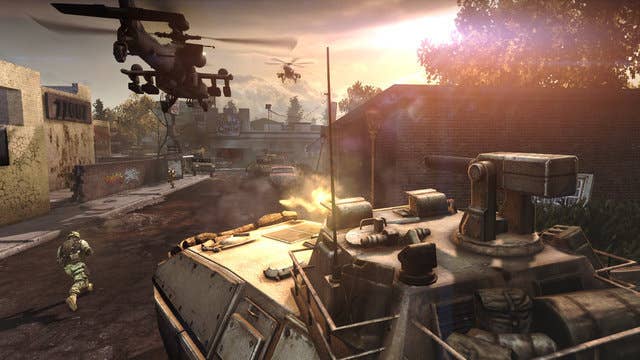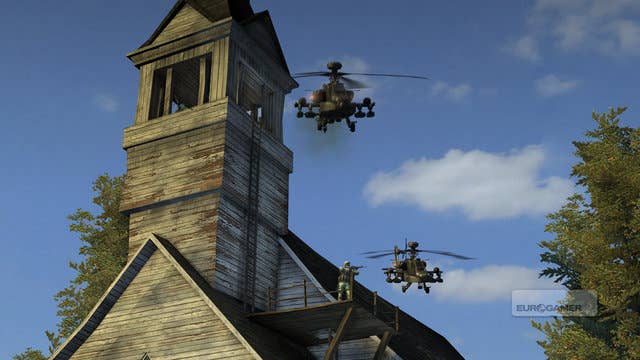Critical Consensus: Homefront
Why does THQ's modern shooter split the critics?
Attempting to break a new IP into the hotly contested FPS genre is no mean feat in today's market, and THQ's commitment to Homefront has variously been interpreted as both admirable and foolish as a result. With the passing of yesterday's embargo releasing a flock of mixed reviews, it seems that opinion on the finished result is just as divided.
Scores have ranged from nines to fives, resulting in a Metacritic average of 71 on PS3 and 75 for Xbox 360. Within that forty per cent range, the rhetoric used to justify those scores varies wildly.
At the top end, sites like Xbox Addict, Gaming Excellence and Totally360 have called the game a reminder of why to love gaming, "a truly fantastic shooter" and a "a breath of fresh air".
Less generous reviewers have described the game as "brief, brittle" (Giant Bomb), and a "a game in thrall" to Call of Duty (Edge). Joystiq does not hold back in its assessment of Homefront as a "brain-dead, dull and frankly pretty lousy final product."
Opportunities for extrapolation, exploration, real emotion are constantly tossed away in favor of rote gunplay.
Alex Navarro, Giant Bomb
As always the best reviews tend to offer a little of both sides of the story. What does seem to be a consensus is that whilst many of the concepts of Homefront are laudible, particularly the atmosphere, much of the implementation is clumsy and lacklustre. Multiplayer is also generally deemed as more praiseworthy than the single player campaign which has come under fire from even the most besotted reviewers as being far too brief.
For Giant Bomb the single-player campaign is a "a five-hour anticlimax" which warrants a 6/10. The consistent promise of emotional attachment and building tension snatched away by shallow characterisation and predictable gameplay. Here is a game, Alex Navarro says, which "plays it safe", with "feeble attempts at emotional resonance", whilst "opportunities for extrapolation, exploration, real emotion are constantly tossed away in favour of rote gunplay."
"Were it not for a small handful of genuinely interesting setpiece battles and a decent multiplayer suite," Navarro claims, "Homefront would be completely dissmisible." Poor AI contributes to Navarro's lack of admiration, too, particularly the game's propensity for invincible companions to occupy the best cover spots so that players are forced to stand in the open.
Originality in the game's multiplayer attracts praise, particularly highlighting especially dangerous players and AI commanders in the deathmatch/domination cross-breed Battle Commander mode, but for Giant Bomb, it's not enough to elevate the game above its peers.

GamePro's Andrew Hayward feels differently, posting a four star review which is full of praise for Homefront's locations, atmosphere and shocking brutality, combined with a daring take on an edgy subject which lends a unique and memorable nature. This framework, Hayward writes, means developer Kaos "conveys this spiralling situation wonderfully".
Single player is a "rousing campaign that spans suburban American terrain while placing you in impressively varied gameplay opportunities" says Hayward, pitching players against a swarming, faceless enemy in realistic terrain which is, for an American native at least, extremely evocative. That campaign is not long enough, however. "The final mission... seemingly appears out of nowhere, as the cadence of the campaign suggested that the endgame was still hours away."
Online multiplayer has "interesting tweaks to genre conventions", which carry it above the average, Hayward feels. Specifically the "Kills and assists (which) earn you points, which can be used immediately to unlock vehicles, armor, heavy weaponry, and the wildly amusing remote control ground drones and mini-helicopters."
The final mission... seemingly appears out of nowhere, as the cadence of the campaign suggested that the endgame was still hours away.
Andrew Hayward, GamePro
Eurogamer's Dan Whitehead is less fulsome in his assessment, writing that "Homefront takes aim at an obvious and broad target, yet somehow still manages to miss the bullseye." Homefront's faceless and mute protagonist is criticised as contributing strongly to a lack of emotional engagement, although Whitehead observes that it's likely that much of the pathos could well be lost on a non-American.
The stilted, overly forced path which the storyline and mechanics force upon the campaign come under Whitehead's fire, who complains of an apparent lack of urgency brought about by drone-like AI.
"The closest you get to breaking ranks is dawdling around while they wait at checkpoints, searching for the glowing golden newspapers that provide your recommended daily allowance of pointless collectible as your companions bellow looped instructions to regroup."
In those moments when the game does allow the player to break from scripted convention, however, Whitehead praises the "perfectly realised" aiming and accuracy, as well as the ability to take tactical decisions on how to tackle situations. These are too brief, nonetheless to warrant any more than the 6/10 which Eurogamer settles on.
In fact, it's only the addition of a "capable" multiplayer which brings Homefront above average, the introduction of Battle Points and the Battle Commander mode being of particular note, bringing a new balance to online matches which flies in the face of COD's 'better kit for veterans' mechanics.

Whitehead's final comments feel much like a fitting summary of Homefront's general impact on reviewers, summing up a mixed response which appreciates the promise shown whilst bemoaning the opportunities missed.
"Homefront floats in the limbo between "not bad" and "pretty good", and is hamstrung by a single-player element that feels like a half-hearted obligation. What's most disappointing is that Homefront wanted so much to join COD and Battlefield at the top of the genre, but has ended up as merely a weekend timewaster for players waiting for the next shooter fix."
